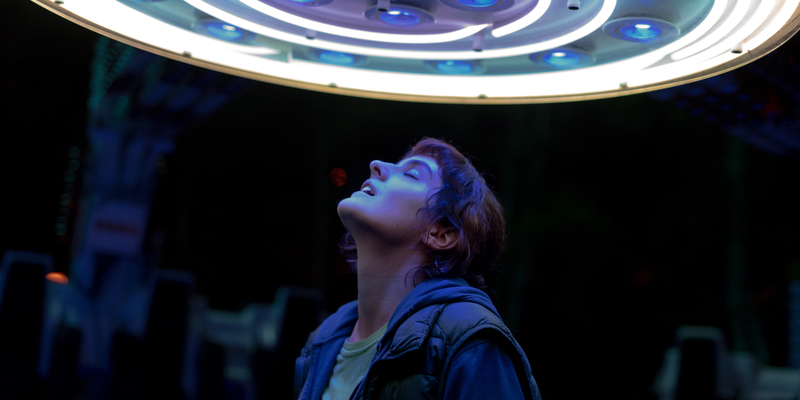
Review by
Eric Hillis
Directed by: Zoé Wittock
Starring: Noémie Merlant, Emmanuelle Bercot, Bastien Bouillon, Sam Louwyck

Fresh off her acclaimed turn in
Portrait of a Lady on Fire, rising French actress Noémie Merlant returns in another tale
of taboo romance in writer/director Zoé Wittock's feature debut
Jumbo. Unlike Portrait, this one is set in modern day France, a setting where few sexual
taboos still exist. One that's still frowned upon is objectophilia, a
sexual attraction towards inanimate objects. As sexual preferences go,
objectophilia is still an erm, object of derision, its practitioners
usually found being mocked on the shows of Jerry Springer and the like.
With Jumbo, Wittock seeks to give us a sensitive portrait of an objectophile, but
whether she succeeds or not is ultimately for objectophiles to
decide.
Merlant is Jeanne, a shy young woman who takes up her annual summer job
cleaning her small town's fairground in the middle of the night.
Preferring to be around objects rather than people, it's the ideal job
for Jeanne, who is so enamoured by the park's rides that she spends her
time off reconstructing them in miniature detail in her bedroom.

One night while cleaning the park's newest attraction, a giant spinning
wheel named "Move It", the ride seems to come to life, its lights
flashing despite Jeanne having shut off its power supply. Over the
following nights it becomes clear that "Move It", which Jeanne renames
as "Jumbo", has become sentient and is able to communicate with Jeanne,
flashing its lights green to answer "Yes" or red for "No". Jumbo is
notorious for making its riders sick, and it makes Jeanne sick to her
stomach - lovesick, that is. It's not long before Jeanne is pleasuring
herself every night on Jumbo's giant frame, and the feeling seems to be
reciprocated, with the ride showering her in its oily ejaculate.
All would be well were it not for the interference of Jeanne's brassy
mother Margarette (Emmanuelle Bercot), who is desperate for her
daughter to find a man and so steers Jeanne into the sinister arms of
the park's sleazy operations manager, Marc (Bastien Bouillon).
When Margarette and Marc discover the "object" of Jeanne's infatuation,
they write her off as mentally troubled, leading to the most
uncomfortable award presentation since
Carrie.

Jumbo certainly commits to a premise that could have
easily been employed as a gimmick designed to generate cheap chuckles.
Wittock ensures that we never laugh at Jeanne, and those who fail to
empathise with her niche sexuality are posited as the villains. Merlant
shrinks into the meek shoulders of Jeanne, delivering a performance that
easily earns our sympathy. But that's where I'm torn on
Jumbo. It's commendable that its message is "Love is love," but too often
the movie strives for our sympathy towards Jeanne rather than our
empathy. The film leaves it ambiguous as to whether Jumbo is indeed
sentient or whether Jeanne is simply retreating into a fantasy world,
but the more the story progresses, the more it leans towards the
latter.
Wittock never quite lays enough groundwork to sell her film's
unconventional relationship, rushing into Jeanne embracing Jumbo's novel
charms too early. The offensive trope of the single mother who seemingly
can't raise her kid properly because she's too busy shagging strange men
is unfortunately heavily employed here, and one character (Sam Louwyck) enters the drama under an initial cloud of intrigue only to be
sidelined until a saviour moment in the climax. The overall feeling is
of a script that was rushed into production when it really needed
another few drafts, possibly from a fresh pair of eyes.

On a superficial level, Wittock may have just pulled off a successful
audition to get herself a gig on a future Marvel or Star Wars movie. The
film's often dark material is offset against an aesthetic heavily
influenced by Spielberg and his clones. Watching Jeanne basking under
the neon lights of Jumbo, it's impossible not to instantly think of
Richard Dreyfuss gazing in wonder at the UFO in
Close Encounters. Transformers appears to be a major influence too, and
you're half expecting Jumbo to take on humanoid form at some point (I'm
no expect on cars, but I believe Margarette's yellow sports car may be
the same model that features in Michael Bay's movies). Along the way,
the likes of ET, Starman and The Iron Giant are hinted
at.
Jumbo looks great, is superbly performed and certainly
means well. Its heart is no doubt in the right place in its portrait of
a sexual identity that even the most liberal among us still largely
dismiss, but while it may help spread acceptance of objectophilia, I'm
not sure it does much to improve our understanding of such an
identity.


